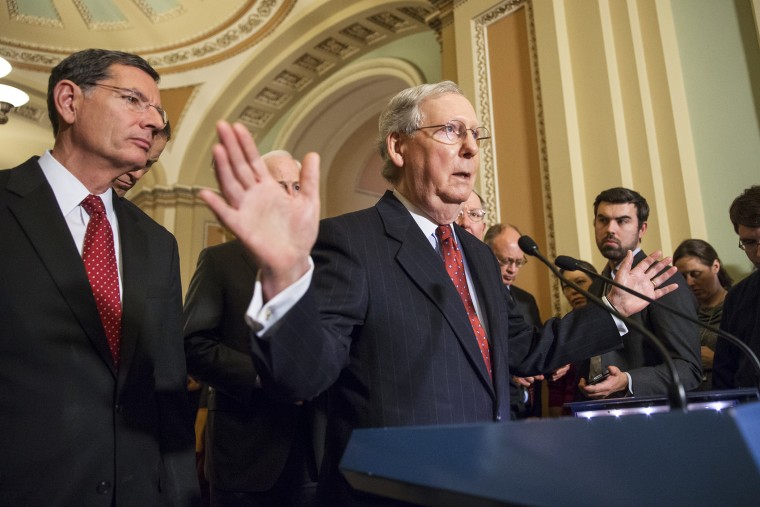Imagine the dynamic that could have existed, but didn't. Imagine if, upon learning about Supreme Court Justice Antonin Scalia's passing, Senate Republicans focused exclusively on the jurist's family and legacy. "Today isn't a day for political posturing," they could have said. "This is a day to celebrate the life and times of an iconic jurist."
In the weeks that followed, in this hypothetical, GOP senators would be pressed to comment on their partisan plans, especially as President Obama moved forward with the process of filing the high court vacancy, but they'd demur. "We intend to do take our duties seriously," they could have said. "Republicans will act in good faith, and in a careful and deliberate way."
When Obama's nominee reached the Senate for consideration, the Republican majority could at least maintain the pretense that they were working through a constitutional process in a mature way, honoring the legitimacy of the American political system.
At a certain point, however, in this imaginary situation, the GOP majority would announce that the president's choice simply wasn't acceptable. "We tried to work with the White House," Republicans would say, "but Obama decided to play politics by nominating a liberal judicial activist. We're disappointed the president wasn't more responsible."
All of this, of course, would take quite a bit of time, running out the clock on the final year of the Obama presidency. It would have been a classic example of corrosive Republican obstructionism, but GOP senators could have given the appearance of seriousness.
This imaginary dynamic, we now know, does not exist. On the contrary, Republicans, in their knee-jerk zeal, immediately ran in the opposite direction.
Republicans, including Senate Majority Leader Mitch McConnell, said that the candidate elected in president in 2016, not Obama, should be allowed to pick the new justice. "The American people should have a voice in the selection of their next Supreme Court Justice. Therefore, this vacancy should not be filled until we have a new President," McConnell said in a statement. Conn Carroll, the communications director for Utah Sen. Mike Lee, who serves on the Senate Judiciary Committee, said, "What is less than zero? The chances of Obama successfully appointing a Supreme Court Justice to replace Scalia?"
Note that Carroll's comment came literally within minutes of the first news reports about Scalia's death.
In every possible way, Senate Republicans have handled this about as poorly as they possibly could have.
While much of the country was still learning of the news, GOP senators, from the leadership to the rank and file, announced in no uncertain terms that President Obama shouldn't even try to fill the Supreme Court vacancy. If he does, Republicans declared that they will not act in good faith: no nominee will be considered or confirmed, regardless of merit or qualifications, because the party says so.
The GOP majority, in other words, has embraced a course that corrupts the process with a showdown unlike anything seen in the modern era. The high court vacancy must remain unfilled for at least 11 months, they say, regardless of the consequences, all because of the unbridled disgust Republicans have for President Obama.
Indeed, to further their obviously ridiculous case, GOP senators have even begun making up rules that didn't exist before the weekend. For example, the Senate doesn't confirm justices in a presidential election year, they've claimed, despite all of the other justices who were confirmed during previous presidential election years.
Let's make this plain: the "no confirmations in an election year" rule simply does not exist. Period. Full stop. There are just too many examples discrediting the idea.
And because Senate Majority Leader Mitch McConnell and his allies in the chamber have already ignored the imaginary approach fleshed out above, the GOP finds itself in a bizarre situation: instead of opposing the president's nominee, Republicans are starting a partisan war over a straightforward process outlined in the Constitution. Instead of a fight over Obama's choice, the far-right majority wants a fight over the legitimacy of the twice-elected president's legal authority.
GOP senators could have been smart about this. They could have thought about this in a tactical and strategic way, preparing themselves for the months ahead. But as is too common, congressional Republicans just couldn't help themselves.
Their Pavlovian instincts -- Obama must be resisted, fiercely and publicly, at all times, even when it doesn't make sense -- have created the conditions for an unsettling test of our system's legitimacy. For reasons they'll struggle to explain, Republicans are eagerly boasting about their intention to force the system to fail.
* Postscript: On Saturday night, the president delivered a brief statement highlighting Scalia's lifetime of public service, and explaining his intentions to nominate a successor. Politico said in response, "President Barack Obama chooses to fight over the Supreme Court." That's a curious way of describing the situation. The president isn't choosing to "fight" so much as he's choosing to nominate someone to fill a Supreme Court vacancy -- which is what presidents are supposed to do. The folks choosing a "fight" in this situation are the one vowing to block a qualified nominee, sight unseen, for brazenly partisan reasons.
